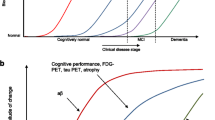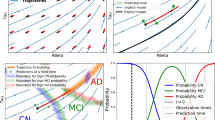Summary
Much has been learned about the clinical symptomatology of Alzheimer’s disease (AD) and ontogenic reciprocal relationships in the past few decades. It is now possible to describe and verify inexorable symptomatic sequences and corresponding temporal relationships. It is also possible to identify more variable symptoms in AD. Ontogenic models can be useful in providing a clearer understanding of the nature of AD symptomatology in terms of both consistency and variability. These models can also be informative in explicating the management needs of AD patients and the treatment possibilities of AD symptoms as well as the etiology of variability in AD symptoms.
Access this chapter
Tax calculation will be finalised at checkout
Purchases are for personal use only
Preview
Unable to display preview. Download preview PDF.
Similar content being viewed by others
References
Auer SR, Sclan SG, Yaffee RA, Reisberg B (1994) The neglected half of Alzheimer disease: cognitive and functional concomitants of severe dementia. JAGS 42: 1266–1272
Braak H, Braak E (1991) Neuropathological stageing of Alzheimer-related changes. Acta Neuropathol 82: 239–259
Braak H, Braak E (1996) Development of Alzheimer-related neurofibrillary changes in the neocortex inversely recapitulates cortical myelogenesis. Acta Neuropathol 92: 197–201
Brun A, Englund E (1981) Regional pattern of degeneration in Alzheimer’s disease: neuronal loss and histopathological grading. Histopathology 5: 549–564
Cioni G, Biagioni E, Cipolloni C (1992) Brain before cognition: EEG maturation in pre-term infants. In: Kostovic I, Knezevic S, Wisniewski HM, Spillich GJ (eds) Neurodevelopment, aging and cognition. Birkhäuser, Boston, pp 75–98
Flechsig P (1920) Anatomie des menschlichen Gehirns und Rückenmarks auf myelogenetischer Grundlage. Thieme, Leipzig
Folstein MF, Folstein SE, McHugh PR (1975) Mini-mental state: a practical method for grading the cognitive state of patients for the clinician. J Psychiat Res 12: 189–198
Franssen EH, Reisberg B (1997) Neurologic markers of the progression of Alzheimer disease. Int Psychogeriat 9 [Suppl 1]: 297–306
Franssen EH, Reisberg B, Kluger A, Sinaiko E, Boja C (1991) Cognition-independent neurologic symptoms in normal aging and probable Alzheimer’s disease. Arch Neurol 48: 148–154
Franssen EH, Kluger A, Torossian CL, Reisberg B (1993) The neurologic syndrome of severe Alzheimer’s disease: relationship to functional decline. Arch Neurol 50:1029–1039
Franssen EH, Souren LEM, Torossian CL, Reisberg B (1997) Utility of developmental reflexes in the differential diagnosis and prognosis of incontinence in Alzheimer disease. J Geriat Psychiat Neurol 10: 22–28
Guttman L (1950) The basis for scalogram analysis. In: Stouffer SA, Guttman L, Suchman EA, Lazersfeld PF, Starr SA, Clausen JA (eds) Measurement and prediction. Princeton University Press, Princeton
Huff FJ, Boller F, Luchelli F, Querriera R, Beyer J, Belle S (1987) The neurologic examination in patient’s with probable Alzheimer’s disease. Arch Neurol 44: 929–932
Jacobs L, Gossman MD (1980) Three primitive reflexes in normal adults. Neurology 30: 184–188
McGeer PL, McGeer EG, Akiyama H, Itagaki S, Harrop R, Peppard R (1990) Neuronal degeneration and memory loss in Alzheimer’s disease and aging. Exp Brain Res [Suppl] 21: 411–426
Paulson G, Gottlieb G (1968) Developmental reflexes: the reappearance of foetal and neonatal reflexes in aged patients. Brain 91: 37–52
Prichep LS, John ER, Ferris SH, Reisberg B, Alper K, Almas M, Cancro R (1994) Quantitative EEG correlates of cognitive deterioration in the elderly. Neurobiol Aging 15: 85–90
Reisberg B (1986) Dementia: a systematic approach to identifying reversible causes. Geriatrics 41: 30–46
Reisberg B (1988) Functional assessment staging (FAST). Psychopharmacol Bull 24:653–659
Reisberg B, Ferris SH, de Leon MJ, Crook T (1982) The Global Deterioration Scale for assessment of primary degenerative dementia. Am J Psychiat 139: 1136–1139
Reisberg B, Ferris SH, Anand R, de Leon MJ, Schneck MK, Buttinger C, Borenstein J (1984) Functional staging of dementia of the Alzheimer’s type. Ann NY Acad Sci 435: 481–483
Reisberg B, Ferris SH, Anand R, de Leon MJ, Schnek MK, Crook T (1985a) Clinical assessment of cognitive decline in normal aging and primary degenerative dementia: concordant ordinal measures. In: Pichot P, Berner P, Wolf R, Thau K (eds) Psychiatry, vol 5. Plenum Press, New York, pp 333–338
Reisberg B, Ferris SH, de Leon MJ (1985b) Senile dementia of the Alzheimer type: diagnostic and differential diagnostic features with special reference to functional assessment staging. In: Traber J, Gispen WH (eds) Senile dementia of the Alzheimer type, vol 2. Springer, Berlin Heidelberg New York Tokyo, pp 18–37
Reisberg B, Ferris SH, Franssen EH (1986) Functional degenerative stages in dementia of the Alzheimer’s type appear to reverse normal human development. In: Shagass C, et al (eds) Biological psychiatry 1985, vol 7. Elsevier Science, New York, pp 1319–1321
Reisberg B, Ferris SH, de Leon MJ, Sinaiko E, Franssen EH, Kluger A, Mir P, Borenstein J, George AE, Shulman E, Steinberg G, Cohen J (1988) Stage-specific behavioral, cognitive, and in vivo changes in community residing subjects with age-associated memory impairment (AAMI) and primary degenerative dementia of the Alzheimer type. Drug Dev Res 15: 101–114
Reisberg B, Franssen EH, Sclan SG, Kluger A, Ferris SH (1989a) Stage specific incidence of potentially remediable behavioral symptoms in aging and Alzheimer’s disease: a study of 120 patients using the BEHAVE-AD. Bull Clin Neurosci 54: 95–112
Reisberg B, Ferris SH, de Leon MJ, Kluger A, Franssen EH, Borenstein J, Alba R (1989b) The stage specific temporal course of Alzheimer’s disease: Functional and behavioral concomitants based upon cross-sectional and longitudinal observation. In: Iqbal K, Wisniewski HM, Winblad B (eds) Alzheimer’s disease and related disorders: progress in clinical and biological research, vol 317. Alan R Liss, New York, pp 23–41
Reisberg B, Pattschull-Furlan A, Franssen EH, Sclan S, Kluger A, Dingcong L, Ferris SH (1990) Cognition-related functional, praxis and feeding changes in CNS aging and Alzheimer’s disease and their developmental analogies. In: Beyreuther K, Schettler G (eds) Molecular mechanisms of aging. Springer, Berlin Heidelberg New York Tokyo, pp 18–40
Reisberg B, Ferris SH, Torossian CL, Kluger A, Monteiro I (1992) Pharmacologic treatment of Alzheimer’s disease: a methodologic critique based upon current knowledge of symptomatology and relevance for drug trials. Int Psychogeriat 4 [Suppl 1]: 9–42
Reisberg B, Sclan SG, Franssen EH, de Leon MJ, Kluger A, Torossian CL, Shulman E, Steinberg G, Monteiro I, McRae T, Boksay I, Mackell JA, Ferris SH (1993) Clinical stages of normal aging and Alzheimer’s disease: the GDS staging system. Neurosci Res Commun 13 [Suppl 1]: 551–554
Reisberg B, Ferris SH, Franssen EH, Shulman E, Monteiro I, Sclan SG, Steinberg G, Kluger A, Torossian CL, de Leon MJ, Laska E (1996a) Mortality and temporal course of probable Alzheimer’s disease: a five-year prospective study. Int Psychogeriat 8: 291–311
Reisberg B, Kenowsky S, Franssen EH, Souren L, Shulman E, Steinberg G, Aronstein Z, Auer SR (1996b) Slowing the progression of Alzheimer’s disease: towards a science of Alzheimer’s disease care. The Fifth National Alzheimer’s Disease Education Conference Proceedings. Alzheimer’s Association, Chicago
Reisberg B, Auer SR, Monteiro I, Franssen E, Kenowsky S (1998) A rational psychological approach to the treatment of behavioral disturbances and symptomatology in Alzheimer’s disease based upon recognition of the developmental age. Int Acad Biomed Drug Res 13: 102–109
Sclan SG, Reisberg B (1992) Functional assessment staging (FAST) in Alzheimer’s disease: reliability, validity and ordinality. Int Psychogeriat 4 [Suppl 1]: 55–69
Sclan SG, Foster JR, Reisberg B, Franssen EH, Welkowitz J (1990) Application of Piagetian measures of cognition in severe Alzheimer’s disease. Psychiatr J Univ Ottawa 15: 221–226
Souren LEM, Franssen EM, Reisberg B (1995) Contractures and loss of function in patients with Alzheimer’s disease. JAGS 43: 650–655
Authors’ address: Dr. B. Reisberg, Alzheimer’s Disease Education and Resources Program, New York University Medical Center, New York, NY 10016, U.S.A.
Author information
Authors and Affiliations
Editor information
Editors and Affiliations
Rights and permissions
Copyright information
© 1998 Springer-Verlag/Wien
About this paper
Cite this paper
Reisberg, B., Franssen, E.H., Souren, L.E.M., Auer, S., Kenowsky, S. (1998). Progression of Alzheimer’s disease: variability and consistency: ontogenic models, their applicability and relevance. In: Gertz, HJ., Arendt, T. (eds) Alzheimer’s Disease — From Basic Research to Clinical Applications. Journal of Neural Transmission. Supplementa, vol 54. Springer, Vienna. https://doi.org/10.1007/978-3-7091-7508-8_2
Download citation
DOI: https://doi.org/10.1007/978-3-7091-7508-8_2
Publisher Name: Springer, Vienna
Print ISBN: 978-3-211-83112-0
Online ISBN: 978-3-7091-7508-8
eBook Packages: Springer Book Archive




